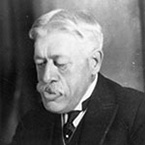
The father of immunotherapy, as William B. Coley became known, was the model for the modern clinician-scientist. He developed his theory that the immune system could be stimulated to fight and ultimately shrink a tumor by following the logical steps in the research process: First, he combed the literature for effective treatments; then developed a treatment using bacterial toxins and tested it on his patients; and then he published his findings, in 1891 in the Annals of Surgery.
Born into an old Connecticut family, educated at Yale University and Harvard Medical School (MD, 1888), Dr. Coley had an illustrious career as a bone surgeon at New York Cancer Hospital. As director of the Bone Tumor Service, he wrote over 150 papers on his methods and injected more than 1,000 patients with “Coley’s Toxins,” as his bacterial product became known. Beginning in 1899, the toxin became available commercially, and it was widely used for the next 30 years. Dr. Coley received financial assistance from the Rockefeller family and, in 1902, a large grant from the Huntington family that is believed to be the first private endowment in the United State designated specifically to study cancer.
Despite examples of efficacy, “Coley’s Toxins” were eventually displaced by radiation therapy. Dr. Coley’s colleagues, especially his supervisor at Memorial Hospital, Dr. James Ewing, the most famous cancer pathologist in the country at the time, found his “vaccine” method dangerous and unpredictable in patients weakened by cancer. It was also more labor-intensive, time-consuming, and expensive than radiation therapy, which Dr. Ewing championed.
Dr. Coley’s principles and methods have been reexamined over the years. His son, Dr. Bradley Coley, an orthopaedic surgeon and his successor at Memorial Hospital, supported the use of “Coley’s Toxins” as adjunctive therapy to surgery, to prevent micro-metastasis. Although “Coley’s Toxins” are rarely used today, researchers believe that some cancers are sensitive to an enhanced immune system and are studying the effect on tumors of tumor necrosis factor, interferons, streptokinase, and many other cytokines. Today many cancer immunologists believe that Coley’s instincts about cancer immunology were correct but that he was ahead of his time. Dr. Coley’s legacy lives on in the Cancer Research Institute, which was founded in 1953 by his daughter, Dr. Helen Coley Nauts, and which is devoted entirely to cancer immunology.